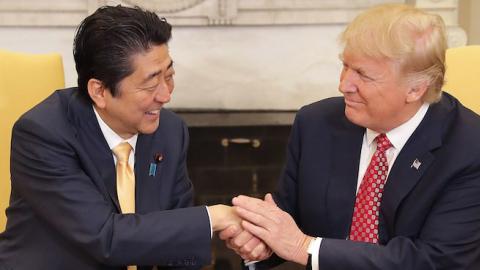Donald Trump says he is for free trade. But it has to be fair trade. He sees himself not as a protectionist but as a protector of American workers from the ravages of unfair competition, somehow defined. In 1964 Supreme Court Justice Potter Stewart said when he was asked to define pornography, "I know it when I see it." Trump knows unfair competition when he sees it. And he believes it is largely responsible for the $502 billion trade deficit the United States ran up last year, the largest in four years and 2.7 percent of GDP.
He sees a lot of the unfair trading coming from Mexico, with which he plans to negotiate major changes in the NAFTA trade agreement. Not so much from Canada, the third party to that agreement. He told visiting Prime Minister Justin Trudeau that their differences could be solved with a bit of "tweaking" since Canadians buy from us about as much as we buy from Canada—our trade is balanced. So the fact that identifies unfair trade might be the existence of a deficit in our dealings with that trading partner.
Not so. The US runs a $69 billion trade deficit with fair-trader Japan, higher than our $63 billion deficit with unfair trader Mexico, mostly because we buy lots of Japanese cars and the Japanese won't buy very many that are made-in-the-USA. They contend that our cars are shoddily made. German manufacturers, with a world-wide reputation for quality cars, also complain that non-tariff barriers prevent them from cracking the Japanese market, so the Japanese defense can be dismissed as without merit. Surely Japan is an unfair trader if there ever was one. Not to President Trump.
Japanese Prime Minister Shinzo Abe, Trump's new best friend (with the possible exception of Israeli prime minister Benjamin Netanyahu), came to Washington bearing gifts for "Donald" as Abe calls him and even Netanyahu did not presume to do—$450 billion in infrastructure investments to create 700,000 jobs; $150 billion investment from Japan's Government Investment Pension Fund; a study alleging that Japanese companies provide 840,000 jobs in America; and a high golf handicap to assure that the president, a near-scratch golfer, would enjoy their weekend together on the links at Mar-a-Lago. Surely not a Trojan horse seeking to get past any walls erected in the process of making America great again.
So Japan's trade surplus is not the mark of an unfair trader, but Mexico's smaller one and China's much larger one ($347 billion) earn both a spot on Trump's list of unfair traders.
In a further search for consistency, we might look to whether the trading partner is a currency manipulator. Alas, here too, Trump alone can spy such activity. China's manipulation of its yuan makes that country a currency manipulator, Japan's manipulation of the yen does not, at least in the President's view. Whether he thinks that Janet Yellen's manipulation of interest rates makes the U.S. a currency manipulator we do not know.
But China has been manipulating the value of the yuan up in order to staunch his nation's currency outflow at the expense of curtailing exports, while Abe has manipulated the yen down by some 40 percent in recent years, with the effect of stimulating exports to America. Nevertheless, China makes the Trump list and Japan escapes dishonorable mention.
And yet, despite Trumpian ad hockery it is possible to see the outlines of a new American trade policy. It will not include large multi-national trade agreements such as the 12-nation Trans-Pacific Partnership, or a deal with the 28-soon-to-be-27-member EU. Our negotiator-in-chief wants to practice the art of the deal one-on-one. Good news for Britain, which he wants to move from the back of Obama's queue to the front of his.
The policy will include taking direct aim at China, in part because of the size of our trade deficit, in part because academic studies now confirm the obvious: China's state-subsidized exports have inflicted great harm on Trump's working class base. No, he won't impose the threatened 45 percent tariff on Chinese goods in violation of WTO rules and counter to the wishes of the large number of Republican congressmen who retain their party's long-held belief that free trade maximizes economic growth. Instead, the administration is considering labelling China a currency manipulator and leaving it to the companies injured by those de facto subsidies to seek clearance from the WTO for the President to lay on retaliatory tariffs.
Small problem. Although we have a trade deficit with China, we still sold some $116 billion of goods and services to that country last year, with agricultural products and airplanes leading the way. That creates a constituency in many farm states and in states with important aircraft manufacturing facilities—Trump country—for avoiding a trade war with China. The overall deficit is somebody else's problem.
These and other problems with Trump's trade policy have set congressional Republicans on a different path. They want to use tax reform to (1) lower the corporate rate from 35 percent to 20 percent, (2) make up for the lost revenue by in effect taxing imports, and (3) make U.S. goods more competitive by freeing export sales revenues from taxation. An importer of, say, a BMW would not be allowed to deduct the cost as a business expense, while the exporter of a Cadillac would pay no tax on revenues from sales in Germany. In effect, this mimics current practice by countries using the value-added tax system.
Goldman Sachs issued a report yesterday contending that this plan is not WTO compliant; other experts disagree. Gary Clyde Hufbauer and Zhiyao (Lucy) Lu of the Peterson Institute for International Economics note it would likely take seven years for any complaint to the WTO to wend its way through the appeals process and result in WTO approval of "countermeasures", by which time Trump will be packing up the White House in anticipation of his return to his Trump Tower eyrie.
Surely the border tax adjustment would result in fairer trade. As economist Larry Lindsey of the eponymous consulting group put it to me, "Nearly every country but America now does this with a VAT." Critics charge that the plan would raise the price of imports—all those trainers, microwave ovens and other products bought by Trump's army of the dispossessed at their local Walmart—by about 20 percent. Not so, say economists. A stronger dollar will enable importers to buy stuff cheaper, offsetting the new border tax. The nation's large retailers met with the president at the White House to tell him to ignore those meddlesome theoretical economists, and Speaker of the House Paul Ryan, and drop the idea entirely. But they do like the idea of a lower corporate tax rate, presumably fully funded by the growth it would stimulate, a long-held myth in some corporate circles.
Trump would like our trade policy to depend on his latest tweet. The American system doesn't work that way. Just as the president can veto an act of Congress, Congress can deny him his wishes by refusing to enact the needed legislation. At this reading it looks as if not much will happen on the trade front until a final decision is made on the shape of tax reform.
















